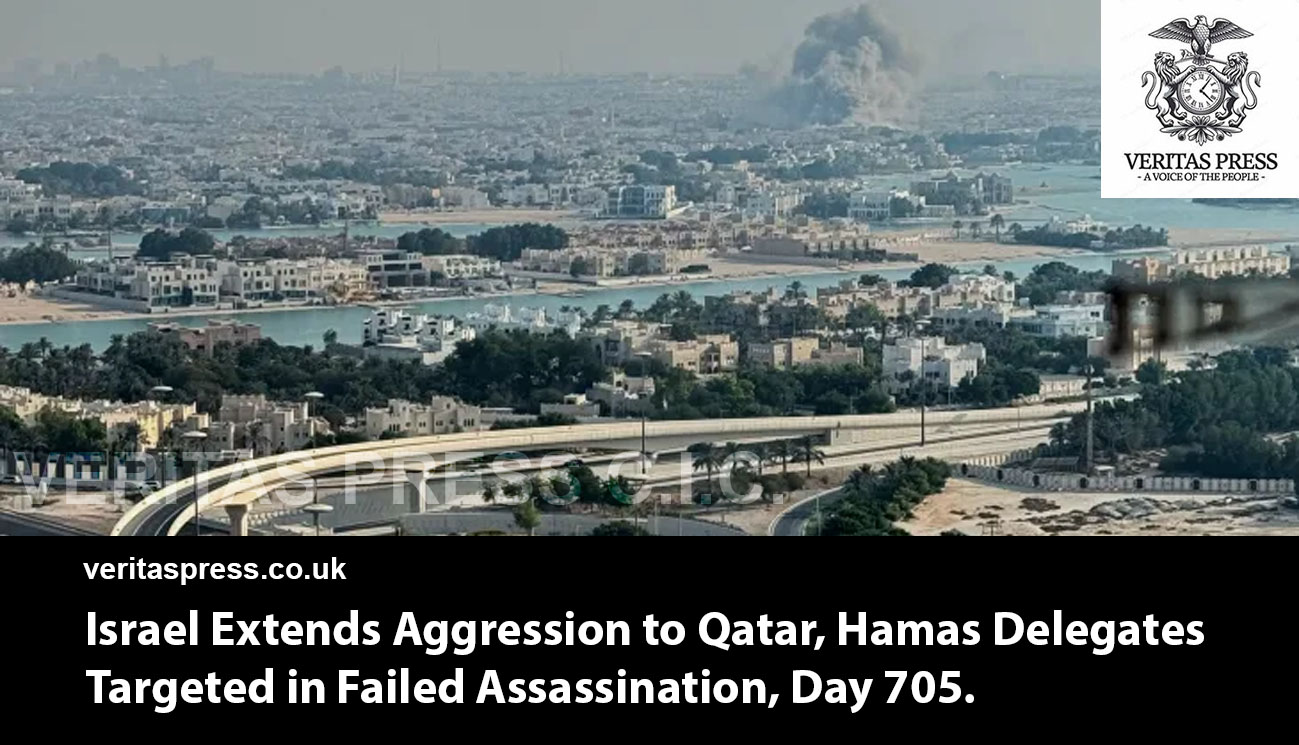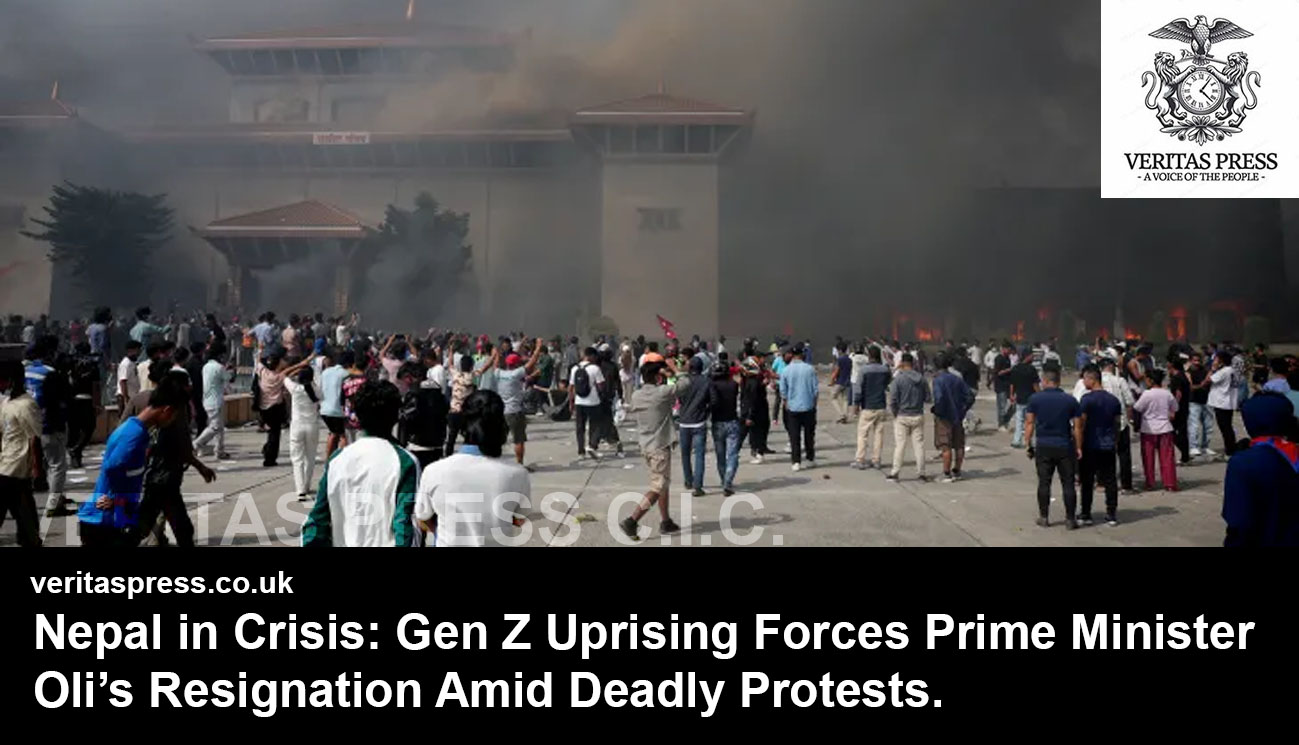Press Release: Veritas Press C.I.C.
Author: Kamran Faqir
Article Date Published: 10 Sept 2025 at 08:47 GMT
Category: Middle East | Qatar | US-Israel At War
Source(s): Veritas Press C.I.C. | Multi News Agencies
DOHA, QATAR – Israel extended its war far beyond Gaza’s borders on Tuesday, launching an unprecedented airstrike in the Qatari capital that targeted senior Hamas negotiators meeting to discuss a U.S.-backed ceasefire plan.
The attack, carried out in Doha’s upscale Leqtaifiya district, killed at least six people, including the son of senior Hamas political leader Khalil al-Hayya, his aide, three bodyguards, and a member of Qatar’s security forces. Hamas confirmed that its leadership survived the strike, which it described as a “cowardly attempt to derail peace talks.”
A Deliberate Breach of Qatari Sovereignty:
Qatar’s Prime Minister Sheikh Mohammed bin Abdulrahman al-Thani condemned the strike as “state terrorism” and a “flagrant violation of Qatar’s sovereignty and international law.”
“There was no warning, no coordination, no justification. This was a deliberate attack on Qatar’s territory, sovereignty, and security,” he said, adding that Israel had sabotaged Washington’s mediation efforts. Qatar has since dispatched a legal team to prepare an international response.
Turkish President Recep Tayyip Erdoğan went further, accusing Israel of having “adopted terrorism as state policy.”He warned that the strike set a dangerous precedent: “If Israel can bomb Doha today, what stops it from targeting any capital tomorrow?”
German Chancellor Friedrich Merz joined the chorus of condemnation, describing the assault as “unacceptable” during a phone call with Emir Sheikh Tamim bin Hamad Al Thani. “The violation of Qatar’s sovereignty and territorial integrity by today’s attack is unacceptable,” Merz said, urging that the Gaza war “must not spread to the entire region.”
Global Condemnation:
Reactions poured in from across the world:
- UN Secretary-General António Guterres condemned the strike as a “flagrant violation of sovereignty”, while the UN Security Council scheduled an emergency session at the request of Algeria and Pakistan.
- Saudi Arabia called it a “brutal act of aggression.”
- France branded it “unacceptable,” and the UK said it violated international law, with Prime Minister Keir Starmer insisting Britain had no prior knowledge of the operation.
- Swedish Foreign Minister Maria Stenergard declared the strike “a grave breach of territorial integrity.”
The Arab League warned that Israel had “opened a new chapter of regional destabilisation” by targeting Qatar, a state that has hosted Hamas leaders at the U.S. request since 2011.
Israel Defiant, Yet Results Unclear:
Inside Israel, media outlets hinted at unease. Army Radio quoted a senior security source admitting, “The results of the attack do not look good and we are not optimistic.”
Israel’s Broadcasting Authority reported authorities had “not yet confirmed whether the operation was successful.” Hamas leaders, including al-Hayya, remain alive and active.
Yet Prime Minister Benjamin Netanyahu has offered no public explanation. Political analyst Ori Goldberg told Al Jazeera:
“Netanyahu has no wish or desire to explain anything. He wants the act itself done in real time, blurry images, and sound effects from the cockpit. That’s all he cares about. Whenever he feels his control is shaken, he opens another front.”
U.S. Position And Strategic Fallout:
The White House admitted it had been informed “shortly before the strike” but denied any operational involvement. President Donald Trump called the incident “unfortunate”, though he insisted that eliminating Hamas leaders remained a “worthy goal.”
Analysts said this response has further weakened U.S. credibility. Adam Weinstein of the Quincy Institute told Al Jazeera:
“The Trump administration is trying to have its cake and eat it too. The very place where these negotiations were taking place has been targeted. How is this possibly beneficial for peace?”
Former U.S. intelligence official Ted Singer warned that Gulf states would now reassess their reliance on Washington’s security guarantees. “This could have profound implications for how regional states view U.S. protection. If Qatar can be bombed with a major U.S. base sitting just 30 kilometres away, what faith can they have in America’s umbrella?”
A Turning Point For The Gulf:
For decades, Gulf monarchies relied on U.S. protection while investing billions into American defence industries. Qatar hosts al-Udeid Air Base, the largest U.S. installation in the Middle East, and recently pledged over $100 billion in aircraft purchases.
Now, analysts say, Israel’s action has “eviscerated”the credibility of that security model. Merissa Khurma of the Baker Institute remarked:
“If there were any fears about Israel’s destabilising ambitions, they have just been tripled. No one is spared. This will shake Gulf confidence in the entire U.S.-led formula.”
Former U.S. ambassador to Qatar Patrick Theros predicted the strike would push Gulf states closer to Iran and China: “China is going to be all over this. And Saudi Arabia’s outreach to Iran will accelerate.”
Day 705: The War Expands Beyond Gaza.
Since October 7, 2023, Israel’s war on Gaza has killed at least 100,000 Palestinians and injured or maimed over 377,000, the majority women and children, according to the Palestinian Ministry of Health.
By striking Qatar, a country far from the battlefield and central to ceasefire talks, Israel has internationalised the war in a way not seen before.
Qatar’s Foreign Ministry stated bluntly:
“This attack was not an accident. It was a calculated act to derail diplomacy, destabilise the Gulf, and humiliate Qatar. It will not succeed.”
Israel’s strike on Doha is more than an assassination attempt; it is a declaration that no state is off-limits in its war. The fallout is already reshaping regional alliances, undermining U.S. influence, and pushing the Gulf into uncharted geopolitical waters.
As one Arab diplomat told Middle East Eye:
“Israel has shown it is willing to bomb anywhere, anytime, even the very capitals trying to negotiate peace. That is not just a breach of sovereignty; it is an act of war.”
Timeline Of Israel’s Strike On Hamas Delegation In Qatar, Day 705:
September 9, 2025
- 3:46 PM (UTC+3) – Israeli airstrike in Doha
Israel launches a missile strike in the Leqtaifiya district, targeting a Hamas delegation meeting to discuss a U.S.-proposed Gaza ceasefire. The building struck is near residential areas and a U.S. military presence. - Immediate casualties reported
- Son of senior Hamas leader Khalil al-Hayya
- His top aide
- Three bodyguards
- A member of Qatar’s security forces
Hamas confirms top leadership survived the strike.
- Qatar condemns the attack.
Prime Minister Sheikh Mohammed bin Abdulrahman al-Thani calls it “state terrorism” and a “blatant violation of sovereignty.” Qatar rejects claims of prior warning from the U.S. - German Chancellor Merz reacts.
During a phone call with Emir Sheikh Tamim bin Hamad Al Thani, Merz calls the strike “unacceptable”, warns of regional destabilisation, and praises Qatar’s mediation role. - U.S. response
White House confirms late notification but denies operational involvement. President Trump calls the strike “unfortunate” but insists removing Hamas leaders is a “worthy goal.” Analysts highlight damage to U.S. credibility. - UN Security Council emergency session scheduled.
Algeria and Pakistan request a briefing on the incident, signalling global concern over the breach of Qatari sovereignty and international law. - Global condemnation mounts
France, the UK, Saudi Arabia, Turkey, Sweden, and the Arab League denounce the strike. Statements emphasise the violation of Qatar’s territorial integrity and risks of regional escalation. - Israeli domestic media
- Army Radio quotes sources expressing doubts about the strike’s success.
- Israel’s Broadcasting Authority notes no confirmation of whether targeted Hamas leaders were killed.
- Regional and strategic fallout
Analysts warn that Gulf states will reassess their reliance on U.S. security guarantees. Former CIA operations chief Ted Singer notes possible realignments toward Iran and China.
Conclusion: Israel’s Strike On Qatar, State Terrorism And The Erosion Of Sovereignty:
Israel’s airstrike in Doha is not simply a military operation; it constitutes a deliberate act of state terrorism that violates the sovereignty of Qatar, a neutral diplomatic mediator hosting peace talks. By targeting senior Hamas negotiators on Qatari soil, Israel demonstrated a willingness to weaponise force against foreign states to achieve political objectives, a move that crosses both international law and accepted norms of state conduct.
The strike, executed near residential compounds and a U.S. military base, was precisely timed to coincide with ongoing U.S.-backed ceasefire negotiations, signalling intentional sabotage of diplomacy. As one Arab diplomat told Middle East Eye:
“Israel has shown it is willing to bomb anywhere, anytime, even the very capitals trying to negotiate peace. That is not just a breach of sovereignty; it is an act of war… it is state terrorism.”
Regional and international analysts warn that the repercussions extend far beyond Qatar. Merissa Khurma, of the Baker Institute, notes that Gulf states may now question the credibility of U.S. security guarantees, undermining decades of American influence. Former U.S. ambassador Patrick Theros predicts a possible pivot by Gulf powers toward Iran and China, reshaping the geopolitical landscape.
This strike also exposes the fragility of international law in a conflict where military dominance supersedes diplomacy. The failure to eliminate top Hamas leaders does not mitigate the profound strategic and political consequences: ceasefire efforts are imperilled, diplomatic trust is shattered, and regional security calculations are upended.
By expanding its military reach beyond Gaza to foreign capitals, Israel is normalising cross-border strikes against sovereign states, setting a dangerous precedent for the Middle East. What may have been a tactical failure is, paradoxically, a strategic success for destabilisation, fomenting fear, undermining diplomacy, and asserting unilateral dominance.
Day 705 starkly illustrates that the Gaza conflict has transcended its traditional borders. The war now threatens the Gulf, international diplomacy, and regional stability, highlighting a pattern of state-sanctioned terror that the world cannot ignore. The attack on Qatar should serve as a global warning: when a state weaponises terror as policy, sovereignty and law become casualties alongside human life.
Tags:




























Leave a Reply